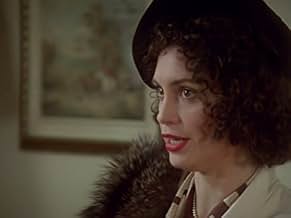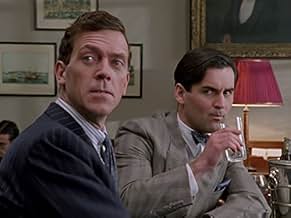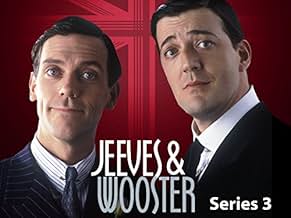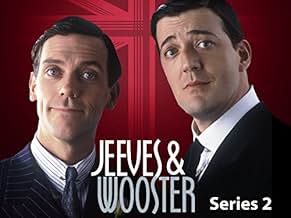Bertram Wooster, un millonario bienintencionado, tiene la costumbre de meterse en problemas, pero con la ayuda de su empleado Jeeves, consigue salir de ellos.Bertram Wooster, un millonario bienintencionado, tiene la costumbre de meterse en problemas, pero con la ayuda de su empleado Jeeves, consigue salir de ellos.Bertram Wooster, un millonario bienintencionado, tiene la costumbre de meterse en problemas, pero con la ayuda de su empleado Jeeves, consigue salir de ellos.
- Ganó 2premios BAFTA
- 2 premios ganados y 3 nominaciones en total
Explorar episodios
Opiniones destacadas
I watched the show before reading the books, but I absolutely adore both. As others have said, the casting of the two main characters is perfect, though i wish Fry could've had more of a chance to show off.
There are a few notable differences between the two mediums, none of which hamper the viewer/reader's pleasure any. In the show, for instance, Jeeves seemed to be more warm-hearted than in the books, where he seemed to me to be more of an untouchable impressive figure, almost cruel at times to Bertie, though always pulling him out of trouble in the end. Fry's portrayal was preferable to the books' character, for me, because I enjoyed the more casual relationship. In the books, Jeeves was almost a father figure, not nearly so close.
One reason i enjoy the show so much is the way it ignores pressing world issues. The prohibition is in full swing over in America, but that is only referenced in one episode. The depression is about to hit, and the entire world is going to feel it, perhaps even Bertie. I've always found this fact to make my viewing all the more interesting, because Bertie and his friends take their wealth so casually. The books are written from Bertie's perspective, and as it's plausible that he would ignore socialism and other radical reform movements, economic disputes, prohibition, and other strife synonymous with the 20s, then so would the show. It's a wonderful departure from reality, into a world where your only worry is how to weasel out of unwanted engagements to less-than-admirable girls, or how to avoid your overbearing aunt.
It's all of these things that really put the Wodehouse stories and their subsequent television adaptations close to my heart, but it's the lovable characters and the flawless portrayal of them by each respective actor that keeps me drawn to watching this show over and over again.
There are a few notable differences between the two mediums, none of which hamper the viewer/reader's pleasure any. In the show, for instance, Jeeves seemed to be more warm-hearted than in the books, where he seemed to me to be more of an untouchable impressive figure, almost cruel at times to Bertie, though always pulling him out of trouble in the end. Fry's portrayal was preferable to the books' character, for me, because I enjoyed the more casual relationship. In the books, Jeeves was almost a father figure, not nearly so close.
One reason i enjoy the show so much is the way it ignores pressing world issues. The prohibition is in full swing over in America, but that is only referenced in one episode. The depression is about to hit, and the entire world is going to feel it, perhaps even Bertie. I've always found this fact to make my viewing all the more interesting, because Bertie and his friends take their wealth so casually. The books are written from Bertie's perspective, and as it's plausible that he would ignore socialism and other radical reform movements, economic disputes, prohibition, and other strife synonymous with the 20s, then so would the show. It's a wonderful departure from reality, into a world where your only worry is how to weasel out of unwanted engagements to less-than-admirable girls, or how to avoid your overbearing aunt.
It's all of these things that really put the Wodehouse stories and their subsequent television adaptations close to my heart, but it's the lovable characters and the flawless portrayal of them by each respective actor that keeps me drawn to watching this show over and over again.
My father introduced me to the Jeeves stories and I fell in love with them. Adaptation can be a tricky affair but this series is done superbly. Hugh Laurie portrayed Bertie just as I pictured the character. I always thought of Jeeves as being older but Stephen Fry portrayal of Jeeves dispelled that notion. The other characters are done well especially Bingo and Aunt Agatha. If you've read the stories a couple of them are usually combined into one episode. Having great material to start with and maintaining that standard is tough but this series does it brilliantly. So if you enjoy Wodehouse or enjoy good farce I highly recommend this series.
If there's any British actor best suited for playing a foppish hero, it would be Hugh Laurie. He does an incredibly good job with Bertram "Bertie" Wooster. I've seen another play that was based on the Woodhouse novels, but the actor playing Mr. Wooster didn't have the same kind of charisma that Hugh Laurie does. Steven Fry is also a very good Jeeves, the butler always helping out Wooster of the bad situations he gets himself into.
5 stars, check it out!
5 stars, check it out!
Any newcomers to the writing of P.G. Wodehouse should bear in mind the following points;
i) Wodehouse was a highly prodigious writer ii) All of his stories feature upper class idiots iii)There is always a happy ending iv) The plots are never plausible v) None of the first four points will prevent you from enjoying his work vi) Wodehouse is one of the greatest ever writers of English prose.
A surprising variety of humourists have been influenced by Wodehouse, including Peter Cook, John Cleese, Michael Palin, Ben Elton, Spike Milligan, Woody Allen and even Billy Connolly.
Television and film adaptations are rarely as good as the original book, but this production is about as good as it gets. Apart from Stephen Fry being rather too young at the time to play Jeeves, the casting is nearly perfect, particularly Hugh Laurie as Wooster.
There are time constraints on television programmes that books are not limited by. There is also the problem that Wodehouse was at his best in narrative passages rather than with dialogue. Nevertheless, this programme will still make you laugh out loud. Great music too.
Better still, read the books. Not just the Jeeves and Wooster titles, but also the Blandings series, Psmith, Mr. Mulliner and Ukridge books.
Whatever your taste in comedy, The Fast Show or Last Of The Summer Wine, Dad's Army or Monty Python, the chances are that PG Wodehouse will make you laugh.
'Jeeves and Wooster' still crops up on satellite and cable channels. It is well worth a look.
i) Wodehouse was a highly prodigious writer ii) All of his stories feature upper class idiots iii)There is always a happy ending iv) The plots are never plausible v) None of the first four points will prevent you from enjoying his work vi) Wodehouse is one of the greatest ever writers of English prose.
A surprising variety of humourists have been influenced by Wodehouse, including Peter Cook, John Cleese, Michael Palin, Ben Elton, Spike Milligan, Woody Allen and even Billy Connolly.
Television and film adaptations are rarely as good as the original book, but this production is about as good as it gets. Apart from Stephen Fry being rather too young at the time to play Jeeves, the casting is nearly perfect, particularly Hugh Laurie as Wooster.
There are time constraints on television programmes that books are not limited by. There is also the problem that Wodehouse was at his best in narrative passages rather than with dialogue. Nevertheless, this programme will still make you laugh out loud. Great music too.
Better still, read the books. Not just the Jeeves and Wooster titles, but also the Blandings series, Psmith, Mr. Mulliner and Ukridge books.
Whatever your taste in comedy, The Fast Show or Last Of The Summer Wine, Dad's Army or Monty Python, the chances are that PG Wodehouse will make you laugh.
'Jeeves and Wooster' still crops up on satellite and cable channels. It is well worth a look.
"Jeeves and Wooster" is a wonderful showcase for Hugh Laurie and Steven Fry, two of my favorite comedians. Their performances carry the series even when the writing starts to falter in the final season.
But the original P.G. Wodehouse books are, it should go without saying, better. Bertie Wooster's narration of his own adventures is hilarious, and much of his bizarre "wit" is inevitably lost in translation to TV. Thankfully, though, Clive Exton's scripts do retain an enormous amount of Wodehouse's original dialogue, which really can't be beat.
All the plots are the same, of course; Wooster is either helping a friend get married, or trying to avoid getting hitched himself. Somehow, though, this repetition doesn't detract from my enjoyment of the series; in fact, it's sort of a wacky bonus. I find that, if anything irks me, it's that some of Wooster's friends are total jerks or weeds who really don't deserve his help - though I suppose that's part of the joke. The oily Gussy Finklenottle drives me absolutely nuts, especially in the first two seasons!
The production values are surprisingly lavish, especially for British TV (though there is a rather lame recreation of the Empire State Building in one episode). The period detail is impressive, and the music is great. The casting is mostly spot-on, too, though some of the guest actors perform a little too grotesquely, and certain very important characters are re-cast midway through the series. It's quite distracting when a major character like Madeline Basset is suddenly played by a new actress, especially when the original Madeline later shows up playing another character, Florence. Thankfully, some of the best cast members stay the course.
There's a definite change in tone after the first two seasons. The show gradually becomes weirder, and when you get to the later episodes Wooster is suddenly getting shot at, jumping off boats, etc. But there's plenty of great material throughout the whole run, and I highly recommend picking up the whole set on DVD. I don't even mind the American characters, who seem to take a lot of heat on this site; aren't the bad accents silly on purpose?
Ultimately, what makes this series so memorable is its offbeat combination of different elements - it's like a comedy of manners, a musical, and a goofy slapstick routine rolled in one. I didn't really get it when I was a kid, but I think it's a hoot now, and Wodehouse's commentary on the laziness of privileged people and the fickleness of love still feels very relevant. Great stuff.
But the original P.G. Wodehouse books are, it should go without saying, better. Bertie Wooster's narration of his own adventures is hilarious, and much of his bizarre "wit" is inevitably lost in translation to TV. Thankfully, though, Clive Exton's scripts do retain an enormous amount of Wodehouse's original dialogue, which really can't be beat.
All the plots are the same, of course; Wooster is either helping a friend get married, or trying to avoid getting hitched himself. Somehow, though, this repetition doesn't detract from my enjoyment of the series; in fact, it's sort of a wacky bonus. I find that, if anything irks me, it's that some of Wooster's friends are total jerks or weeds who really don't deserve his help - though I suppose that's part of the joke. The oily Gussy Finklenottle drives me absolutely nuts, especially in the first two seasons!
The production values are surprisingly lavish, especially for British TV (though there is a rather lame recreation of the Empire State Building in one episode). The period detail is impressive, and the music is great. The casting is mostly spot-on, too, though some of the guest actors perform a little too grotesquely, and certain very important characters are re-cast midway through the series. It's quite distracting when a major character like Madeline Basset is suddenly played by a new actress, especially when the original Madeline later shows up playing another character, Florence. Thankfully, some of the best cast members stay the course.
There's a definite change in tone after the first two seasons. The show gradually becomes weirder, and when you get to the later episodes Wooster is suddenly getting shot at, jumping off boats, etc. But there's plenty of great material throughout the whole run, and I highly recommend picking up the whole set on DVD. I don't even mind the American characters, who seem to take a lot of heat on this site; aren't the bad accents silly on purpose?
Ultimately, what makes this series so memorable is its offbeat combination of different elements - it's like a comedy of manners, a musical, and a goofy slapstick routine rolled in one. I didn't really get it when I was a kid, but I think it's a hoot now, and Wodehouse's commentary on the laziness of privileged people and the fickleness of love still feels very relevant. Great stuff.
¿Sabías que…?
- TriviaIn the television documentary Fry and Laurie Reunited (2010), upon reminiscing about their involvement in the series, it was revealed that Stephen Fry and Hugh Laurie were initially reluctant to play the part of Jeeves and Wooster, but decided to do so in the end, because they felt no one else would do the parts justice.
- ConexionesEdited into Mickey ojos azules (1999)
Selecciones populares
Inicia sesión para calificar y agrega a la lista de videos para obtener recomendaciones personalizadas
- How many seasons does Jeeves and Wooster have?Con tecnología de Alexa
Detalles
- Fecha de lanzamiento
- País de origen
- Idioma
- También se conoce como
- Jeeves and Wooster
- Locaciones de filmación
- Highclere Castle, Highclere, Hampshire, Inglaterra, Reino Unido(Totleigh Towers)
- Productoras
- Ver más créditos de la compañía en IMDbPro
Contribuir a esta página
Sugiere una edición o agrega el contenido que falta

Principales brechas de datos
By what name was Jeeves & Wooster (1990) officially released in India in English?
Responda



































